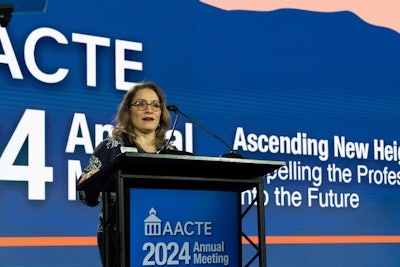AURORA, Colo.—
Educators who train and prepare students to become teachers, gathered this weekend at the annual meeting of the American Association of Colleges for Teacher Education (AACTE) to call attention to the ongoing challenges that face K-12 learning.
AACTE officials said that this year’s theme, “Ascending New Heights: Propelling the Profession into the Future,” aligns with the association’s vision and mission “to revolutionize education for all learners by elevation education and educator preparation through research, professional practice, advocacy, and collaboration.”
In her opening keynote address, Susana Córdova, Colorado’s Commissioner of Education said that the challenge of recruiting and retaining teachers remains an urgent concern not only in Colorado, but across the nation. Susana Córdova, Colorado’s Commissioner of Education delivered the opening keynote at AACTE
Susana Córdova, Colorado’s Commissioner of Education delivered the opening keynote at AACTE
“We’re all working hard to fill the gaps that exist,” said Córdova, adding that the mounting teacher vacancies—particularly in the wake of COVID-19—has been a top priority for school districts across the country.
She told education professors and deans that the work that they’re doing at the higher education level, is helping by preparing future teachers and ensuring that they’re ready for the demands of a future workforce ready to meet the challenging needs that face education today.
But many educators at the annual meeting expressed worries about the political climate that has made it more difficult to encourage college students to consider entering the teaching profession. They point to the grow number of states who have passed legislation —most notably Texas and Florida—that make it more difficult to teach about Black history for example.
Political propaganda and the ongoing culture wars have made life more difficult for teachers who try to help their students understand the importance of diversity and inclusivity.
“I think we’re still in the wake of the Brown decision,” said Dr. Leslie Fenwick, AACTE Dean in Residence and Dean Emeritus of the Howard University School of Education and a tenured professor of educational policy and leadership.
She said that the history of school vouchers and charters, which has since been codified in state charters, is the lingering resistance to the historic 1954 U.S. Supreme Court case that desegrated public schools.
Fenwick appeared on a panel discussion with other experts to discuss the future of American democracy.
Dr. Sigal Ben-Porath, MRMJJ Presidential Professor of Policy, Organizations, Leadership, and Systems Division at the Graduate School of Education at the University of Pennsylvania, said that the polarization of K-12 education is not new. But the political climate, she added, has gone beyond just a critique of curriculum or ideology.
“Now, we’re not just polarized about policy but about each other,” she said. “Increasingly, this polarization is tearing us apart into two camps,” she continued, adding that the shift has created “a distant policy and attitudinal location where we cannot find much common ground.”
As such, the nation is witnessing what Ben-Porath and Fenwick called the “vanishing middle.”
“We see a divide. It’s a red-blue divide,” said Dr. Kevin Welner, director of the National Education Policy Center. He said that the legal protection for teachers across the nation are difficult.
“In many places, it’s a really difficult job right now,” said Welner. “And the smart thing for people who want to keep their job is to keep their head very low.”
Welner said that there is often a disconnect between educators and policymakers.
At the three-day convening, education professors like Dr. Kasey Johnson said that she had come to the annual meeting to network with other scholars who train teachers. But she said that she is also concerned about the lack of Open Educational Resources that would greatly benefit from low-income students who cannot afford to buy expensive textbooks.
“Why are we creating more barriers for students?” asked Johnson, who is also the chair of the Education Department at Ottawa University in Kansas. A former K-12 teacher who has been in education for 24 years, Johnson said that AACTE has been an important professional organization.
“Collaboration and encouragement is important,” she said. “I am not interested in reinventing the wheel.”















